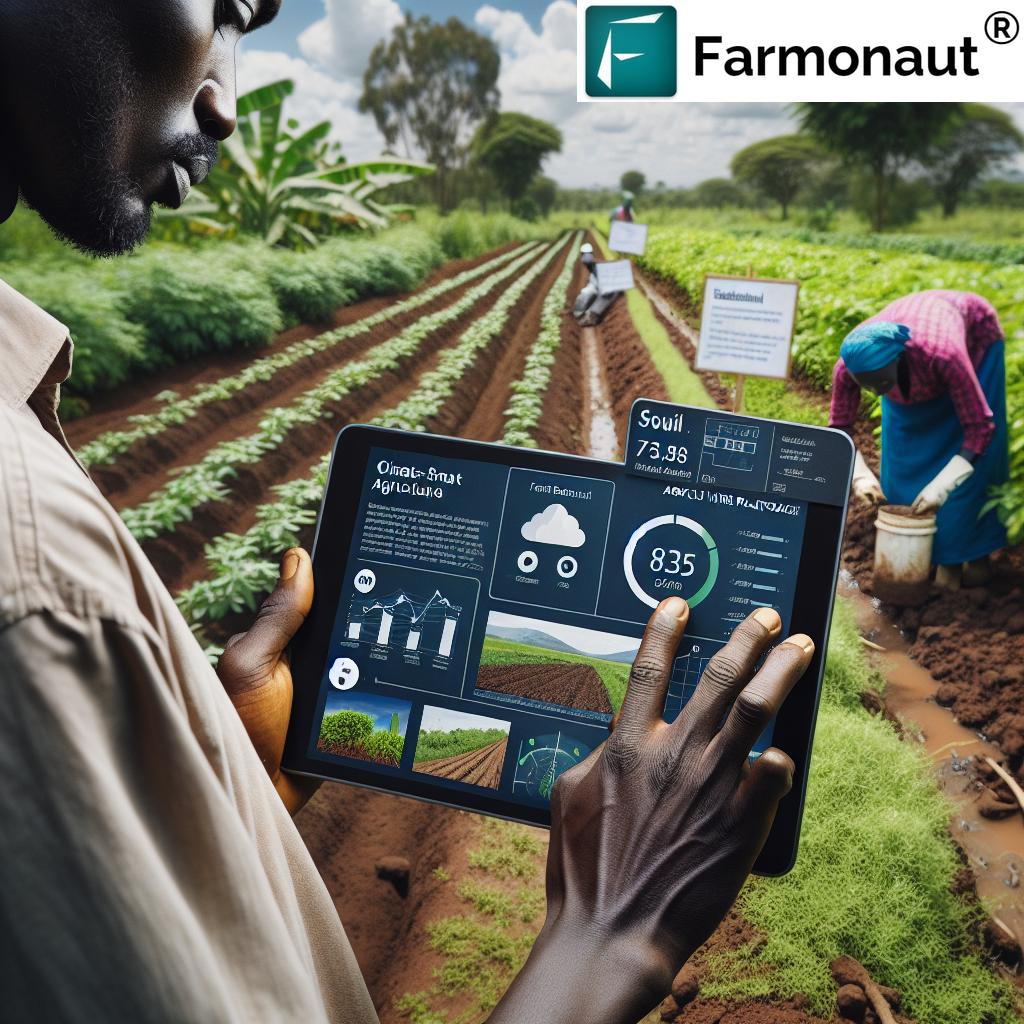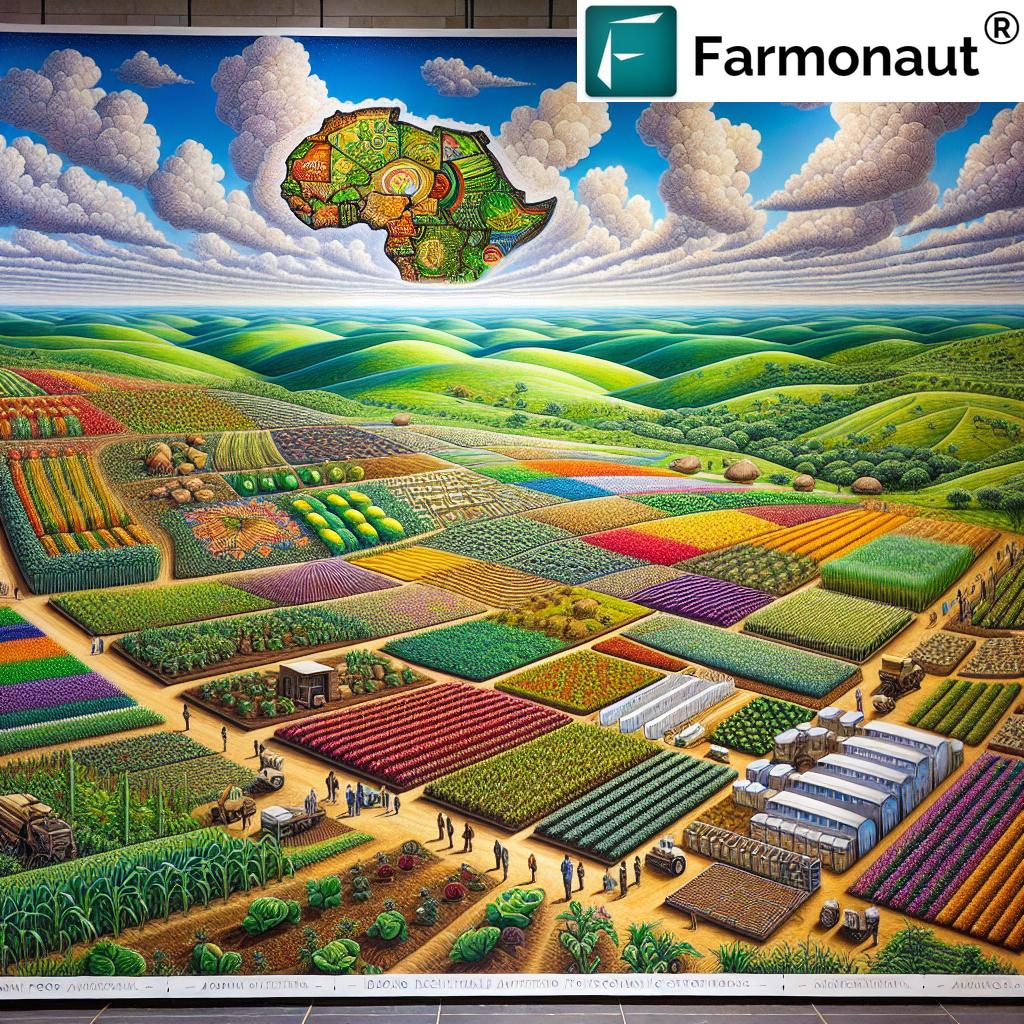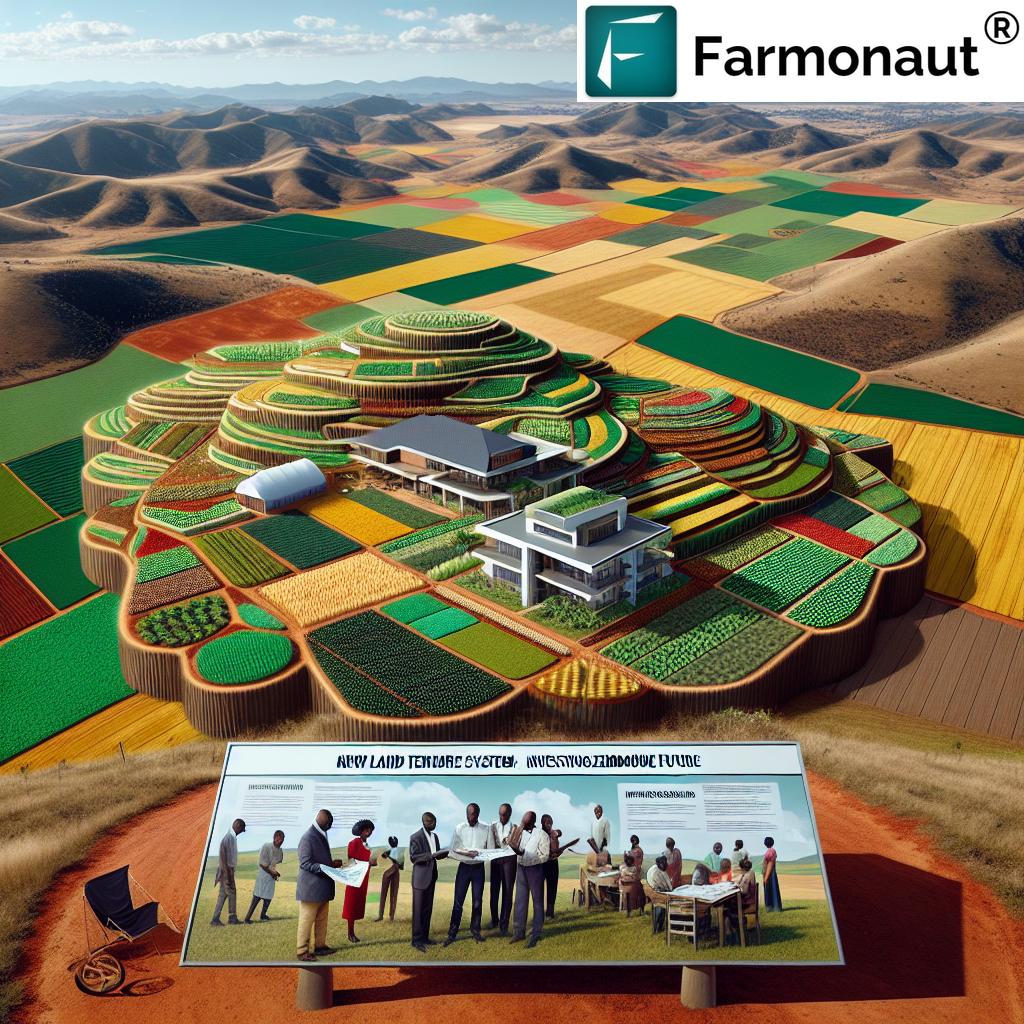Africa Agri Tech 2025: Transforming Agriculture Africa
“By 2025, agri-tech innovations are projected to increase African farm yields by up to 30%.”
Summary: Agriculture Africa in 2025
Agriculture remains a critical pillar—indeed, the backbone—of African economies. By 2025, agri-tech is fueling a transformative leap across the continent, with South Africa leading as an example of modernized, technology-driven farming. New innovations are enhancing productivity, sustainability, and resilience by integrating satellite insights, AI-driven advisory, and mobile platforms that connect rural communities to markets and resources. Advanced technologies also unlock long-term sustainability—from climate-smart agriculture to traceability solutions—while providing economic empowerment for farmers both directly and indirectly.
Focus Keyword: Africa Agri Tech 2025
The Importance of Agriculture in Africa: Sector Overview
The agriculture sector in Africa underpins the livelihoods of over 60% of the continent’s population—supporting nations both economically and socially. Agriculture Africa is not just about food production; it is intertwined with rural development, employment opportunities (especially for youth), and ecological stewardship.
- Agriculture Africa employs millions, either directly through farming or indirectly through supply chains.
- It contributes an average of 23% to Africa’s GDP, with higher shares in countries reliant on commodity crops.
- In South Africa, diversified agriculture farming systems—from grains and fruit to livestock—support a vital export industry, while local production anchors food security.
Yet, the sector faces modern challenges: a rapidly growing population demands more food, while climate change threatens agricultural outputs. Meeting these needs requires innovation, resilience, and sustainable practices.
Challenges Shaping Modern Agriculture in Africa
Agriculture Africa is at a crossroads. The sector faces a set of dual challenges:
- Feeding a rapidly growing population: By 2025, Africa will be home to approximately 1.4 billion people. With urbanization rising and demand for food soaring, traditional farming methods struggle to keep pace.
- Adapting to climate change: Erratic rainfall, frequent droughts, water scarcity, and land degradation increasingly disrupt farming across diverse agro-climatic zones.
Other Critical Hurdles
- Soil nutrient depletion and crop pests impact yields.
- Smallholder farmers often lack access to finance, quality inputs, markets, and timely data.
- Lack of infrastructure for post-harvest management creates loss and waste.
- Volatile commodity prices present economic risks to producers and rural communities.
To address these challenges, a sweeping transformation—fueled by agri-tech innovation—is underway, especially in countries like South Africa.
Africa Agri Tech 2025: The Transformative Revolution Powered by Agri-Tech
Agri-tech is redefining what’s possible for agriculture of Africa—making 2025 a landmark year for technological integration. This transformative revolution is propelled by:
- Advanced technologies that redefine productivity
- A focus on sustainable practices and climate resilience
- Development of digital platforms for farm management, advisory, and resource optimization
- Adoption of satellite monitoring, AI-driven insights, and blockchain for traceability
This dynamic shift has attracted investment and fostered ecosystems of government agencies, universities, and private sector enterprises working towards a shared vision: robust, inclusive, sustainable agricultural growth.
Precision Agriculture and Digital Transformation: The Backbone of Modernization
Precision agriculture is at the heart of agriculture modernization, especially in the agriculture sector in South Africa. By 2025, technologies once seen as futuristic have become industry standards, empowering farmers to:
- Monitor soil health with sensors and satellite imaging—tracking moisture, nutrients, and crop vigor meticulously.
- Optimize irrigation schedules using real-time weather updates and advanced data insights—conserving precious water resources.
- Leverage drone surveillance for pest detection, crop assessment, and land mapping, minimizing both labor and input costs.
- Implement data-driven decisions to target fertilizer and pesticide use, reducing waste and boosting crop yields.
In South Africa, these innovations are increasingly accessible, equipping modernized farms with tools that were once reserved for large commercial holdings, but now extend beyond to reach smallholder communities. This democratization of technology is a game changer for productivity and sustainability across the continent.
Key Agri-Tech Innovations Transforming African Agriculture in 2025
The following table summarizes the most impactful agri-tech innovations defining Africa’s agricultural landscape in 2025. These technologies deliver tangible advances in productivity, sustainability, and economic resilience, reshaping the future of farming from South Africa to far-reaching rural corners of the continent.
| Agri-Tech Innovation | Description | Geographic Focus | Estimated Adoption Rate (2025, %) | Estimated Productivity Increase (%) | Sustainability Impact |
|---|---|---|---|---|---|
| Precision Farming | Use of sensors, satellite imaging, AI, and data analytics for resource-efficient, targeted crop management | Africa (notably South Africa) | 25% | 30% | Optimizes inputs, conserves water, reduces waste, and improves soil health |
| Drone-Based Monitoring | Drones for aerial surveillance, crop/pest analysis, and land mapping | Regional hotspots including South Africa | 14% | 22% | Enables early pest detection and targeted interventions, reducing pesticide use |
| Smart Irrigation | IOT-driven or AI-enabled irrigation that adapts to soil moisture and forecast data | Africa—especially arid and semi-arid areas | 18% | 28% | Saves water, increases drought resilience, and improves yields |
| Climate-Resilient Seeds | Genetically improved varieties resisting drought, pests, and diseases | Continent-wide, with regional breeding programs | 33% | 24% | Reduces crop failure and improves adaptability to climate change |
| Mobile Agricultural Platforms | Apps offering weather, pest, and market data, as well as microloans | Africa, extensive adoption in South Africa | 41% | 19% | Powers inclusion, access to finance and markets for smallholder farmers |
Digital Agriculture Platforms: Connecting Farmers for Growth
By 2025, mobile agricultural platforms have become essential to agriculture farming in South Africa and throughout the continent. They offer vital digital services that support smallholder and commercial farmers alike:
- Real-time weather updates to plan farm operations and avoid climate risks
- AI-powered pest and disease alerts for timely action and reduced crop loss
- Access to finance—such as microloans—using remote sensing for risk assessment
- Direct marketplace connections for input procurement and produce sales
- Remote field monitoring, resource tracking, and advisory
This democratization of information accelerates rural inclusion, helping resource-constrained communities improve yields and minimize waste. Increased smartphone penetration (
 ) and internet access ensure broad adoption. Digital platforms now serve as a bridge to rural empowerment, food security, and livelihood resilience.
) and internet access ensure broad adoption. Digital platforms now serve as a bridge to rural empowerment, food security, and livelihood resilience.
Farmonaut’s Platform exemplifies how  makes satellite-driven insights affordable and accessible for all. Our web, Android, and iOS apps unlock tools for real-time crop health monitoring, environmental tracking, and farm management—empowering farmers, agribusinesses, and government agencies across Africa with actionable data. This is essential for optimizing decisions in areas like soil health, irrigation, and pest control, directly boosting productivity and sustainability.
makes satellite-driven insights affordable and accessible for all. Our web, Android, and iOS apps unlock tools for real-time crop health monitoring, environmental tracking, and farm management—empowering farmers, agribusinesses, and government agencies across Africa with actionable data. This is essential for optimizing decisions in areas like soil health, irrigation, and pest control, directly boosting productivity and sustainability.
Sustainable Practices and Climate-Smart Agriculture
Sustainability is not just a vision for agriculture africa—it is a necessity. The evolution of farming practices is deeply intertwined with solutions for climate change, environmental stewardship, and food system resilience. Sustainable methods now mainstreamed across the sector include:
- Conservation agriculture: minimal tillage, crop rotation, cover cropping, and integrated pest management
- Carbon footprint tracking with Farmonaut: Real-time monitoring helps African farmers and agribusinesses reduce emissions and report accurate carbon data for compliance and sustainable branding
- Efficient input use: precision application of fertilizers, water, and crop protection based on need
- Blockchain-based traceability: ensures food safety, ethical sourcing, and authenticity for consumers, supporting trust in regional supply chains. Our integrated traceability feature brings transparency to agricultural products from farm to market.
- Climate-smart seed adoption: improved cultivars resistant to drought, pests, and soil degradation
- Agroforestry and regenerative agriculture: restoring degraded land and conserving biodiversity
Farmers in South Africa are increasingly deploying these sustainable practices using digital tools and advice available through farm management apps like our Crop Plantation and Forest Advisory platform, empowering communities to conserve resources and enhance long-term soil health.
Emerging Agri-Tech: AI, IoT, and Advanced Data Solutions
The crest of agri-tech evolution in 2025 is defined by intelligent algorithms and connected devices:
AI and Machine Learning
- AI-driven predictive analytics for yield forecasts and early pest outbreak alerts
- Automated image analysis for crop health, soil status, and land degradation
- AI-powered advisory systems delivering instant recommendations via smartphone or web
Our platform at Farmonaut incorporates Jeevn AI Advisory to turn satellite data into actionable advice—helping users make critical decisions on fertilizer application, irrigation, and pest management, all in real-time.
IoT—Internet of Things
- IoT-enabled sensors for continuous soil, moisture, and plant monitoring
- Automated adjustments to irrigation schedules and input dosing, responding instantly to environmental data
- Informed resource management—reducing input costs and waste
Blockchain and Traceability
- Blockchain-based supply chain monitoring verifies the journey of produce—ensuring authentic, sustainably produced agricultural exports.
- Farmonaut’s traceability tools foster trust in African agri-value chains, vital for international markets and food safety.
Satellite Imaging & Resource Management
- Multispectral satellite imagery tracks NDVI (vegetation health), soil moisture, and land cover change at field and regional scales.
- Large-scale farm management leverages satellite-driven monitoring for operational oversight and reporting.
- Advanced API access (developer documentation here) enables seamless data integration into agribusiness supply chains, platforms, and research projects.
- Fleet management (read more) with real-time tracking improves logistics and reduces operational inefficiency in large agribusinesses.
The Future of Agriculture in South Africa: A Model for Africa
South Africa has become both a regional hub and model for how advanced technologies can unlock new potentials in agriculture africa:
- Adoption of precision farming is rapidly escalating thanks to government, private sector, and grassroots initiatives.
- Collaborative ecosystems between universities, business, and state agencies accelerate research and development of context-specific solutions.
- By leveraging real-time satellite monitoring and AI, resource management and field productivity achieve new heights.
- With sustainable farming methods mainstreamed, South Africa is poised for resilience in the face of environmental and economic volatility.
Farmonaut: Satellite Insights Empowering the Agriculture Sector in Africa
We at Farmonaut contribute uniquely to this evolution by making satellite-driven insights affordable and seamless for users across the continent:
- Real-time multispectral monitoring via our web, Android, and iOS apps empowers farmers to monitor crop health, drought stress, pest infestations, and soil moisture without expensive on-site equipment.
- Jeevn AI Advisory System interprets satellite data for on-the-spot recommendations—boosting efficiency for resource-constrained users and large enterprises alike.
- Environmental impact monitoring enables compliance, international market access, and sustainability branding by tracking and reporting carbon footprints in agriculture.
- Fleet management tools help agribusinesses optimize logistics, manage risk, and ensure safety—critical as farm operations scale up.
- Satellite-based verification streamlines crop loan and insurance for African farmers by offering objective, fraud-proof assessment, making finance more accessible in rural areas.
- Developers and research organizations leverage our API and developer docs for seamless integration of satellite data into custom agri-tech solutions and analytics workflows.
- Farmonaut’s modular subscription model (see pricing options below) supports scalable adoption, from smallholder users to agro-enterprises and government agencies.
Our value proposition aligns perfectly with the drive toward economic empowerment, resilience, and modernization in Africa’s agricultural sphere.
Opportunities, Youth, and Economic Growth
Modern agriculture africa goes beyond yields and markets—it’s sparking a new era of economic opportunity:
- Youth employment is rising in digital farm management, drone operations, agri-data analysis, and tech support roles.
- Youth migration reversal: instead of moving to cities, young people are harnessing technology to become agri-preneurs in their own rural communities.
- Financial inclusion: Through digital satellite-verified crop loans and insurance, even unbanked rural populations can now access critical resources for growth and resilience.
For entrepreneurs and start-ups, the convergence of agri-tech and mobile-first digital solutions (see Farmonaut’s Apps above) opens new markets and business models. Governments and private actors continue to invest in research, education, and training—building a knowledge-driven agriculture of Africa that is fit for the future.
Frequently Asked Questions: Africa Agri Tech 2025
What is Africa Agri Tech 2025?
Africa Agri Tech 2025 refers to the transformative integration of advanced technologies—such as precision agriculture, AI, satellite monitoring, and digital platforms—into farming practices across Africa and South Africa. By 2025, these innovations are designed to enhance productivity, sustainability, and economic resilience in the agriculture sector.
How is agriculture farming in South Africa changing in 2025?
South Africa is rapidly adopting precision farming tools like sensors, satellite imaging, and drone surveillance. These technologies enable farmers to monitor crop and soil health, optimize resource inputs, reduce waste, and improve profitability—while sustainable methods and digital inclusion raise productivity for smallholders and commercial farms alike.
What are the main challenges facing agriculture of Africa?
Key challenges include feeding a growing population, adapting to climate change, resource scarcity (water, land), soil degradation, pest outbreaks, and poor market access for smallholder farmers. Fluctuating commodity prices and limited access to finance also impact the sector.
How do digital platforms benefit African farmers?
Digital platforms connect smallholder farmers to real-time weather information, pest and disease alerts, market pricing, and financial services. By democratizing information and resources, these platforms increase yield potential, reduce risk, and enhance economic inclusion—especially in rural communities.
What role does satellite technology play in Africa agri-tech?
Satellite technology enables remote and real-time monitoring of crop health, soil conditions, and environmental impact. Platforms like Farmonaut provide these insights affordably, supporting decision making, regulatory compliance (such as carbon footprint reporting), and precision resource management at both small and large scales.
Can smallholder farmers access satellite-based solutions?
Yes, modern service providers like Farmonaut have democratized satellite-based solutions by offering them via web, Android, and iOS apps as well as API. With scalable subscriptions and user-friendly tools, smallholders, agribusinesses, and governments can benefit from affordable, powerful agri-tech services.
Conclusion: Embracing Agri-Tech Innovation for a Sustainable Future
Africa Agri Tech 2025 signals a future where African farming is smart, sustainable, and inclusive. As South Africa leads the continent with digital adoption, precision agriculture, and sustainable practices, the entire sector is poised to:
- Elevate productivity while conserving natural resources
- Adapt rapidly to climate shocks, market volatility, and environmental risks
- Boost food security and rural empowerment
- Attract youth and diversify opportunities through digital skill-building and tech-driven entrepreneurship
- Deliver lasting economic growth and ecological resilience across the continent
With user-focused platforms, innovative tools, and a collaborative drive for progress, agriculture in Africa is undergoing a transformative revolution. By embracing advanced technologies and sustainable, climate-smart practices, we make agriculture not just the backbone of today’s economies, but the engine of tomorrow’s prosperity and food security.
For more information on satellite-driven agricultural insights, scalable management tools, and affordable precision monitoring, explore the Farmonaut app for web, Android, and iOS download options above. Harness the power of digital transformation in agriculture Africa—and be part of the future of food and environmental sustainability.











